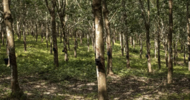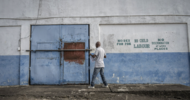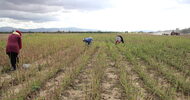
A mother of eight, Hoy Mai, at five-months pregnant was arrested and imprisoned in a Cambodian jail in 2009 after she asked the government to return her community’s ancestral land, according to Amnesty International.
Mai’s home and more than a hundred other houses were burned and bulldozed by a sugar company with government approval in the village of Bos in eastern Cambodia, according to Amnesty. Many of the families are now homeless and most of their personal belongings were destroyed along with their houses.
Her story is one of many documented in an Amnesty report that was released on Thursday, detailing the land grabbing practices afflicting tens of thousands of people. The rights group is calling on the Cambodian government to stop the forced evictions.
Amnesty published the report just days after a leading activist against the practice killed herself in the capital, Phnom Penh after officials forced her family to leave their home without giving them compensation.
Forced evictions, which Amnesty says are carried out by sugar and mining companies at the behest of Cambodian authorities, “contravene international human rights treaties and tear families apart,” states Donna Guest, rights group’s Asia regional director.
“They must ensure that genuine consultations are held with the people affected, and that residents receive sufficient notice and compensation or adequate housing where there is no alternative to eviction,” she added.
Women like Mai have been pushed to the forefront of the crisis and have had to stand up against the authorities to protect their land. Rights groups estimate that in the past 20 years, 1 in 10 peoples in the Phnom Penh have been forcibly evicted from their homes, which Amnesty says could jeopardize the economic and human rights progress Cambodia has made in recent years.
In compiling its report, Amnesty interviewed five Cambodian women to put a human face on the problem, saying women are forced to stand up to corporations and the government, as they are the ones who have to stay home to care for their children.
“My house, possessions, clothes, all went up in smoke. Nothing was left,” said Mai, adding that police threatened to shoot anyone who offered resistance. She was sentences to eight months and was only released after she signed an agreement with local officials to give up her land in the process. Amnesty said she now has very little resources to provide for her children and has not seen her husband since. Despite there being laws and regulations that are supposed to protect people from forced evictions, the London-based rights group says the government regularly circumvents them.
For many Cambodians, land ownership is a tricky thing to prove as legal documents were destroyed under the brutal communist regime of the Khmer Rouge from 1975 to 1979.
Nearly 20,000 people have been evicted in the Boeung Kak Lake area near Phnom Penh after a commercial development company was given 99-year lease in 2007, said Amnesty.
Vanny, 31, who lives in Boeung Kak Lake, is helping other women fight the evictions. She told Amnesty that while she feels the resistance the community has put up against the company, “is the first success of people’s demonstration” in the country, she is unsure if she’ll ever get to return home. The local government has charged Vanny with defamation.
“The Cambodian government must not sacrifice human rights in the name of economic development,” Guest said.













